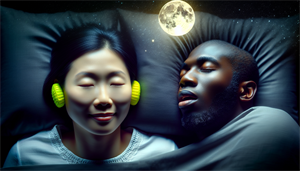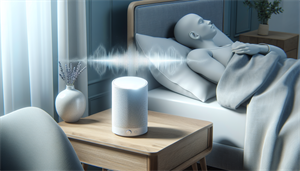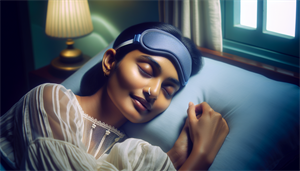Can’t sleep due to a snoring partner? In this guide, we tackle what to do when someone is snoring and you can’t sleep. Find out practical steps for silencing the snores tonight and uncover deeper solutions for the long term. Let’s dive into actionable advice to turn your sleepless nights into well-deserved slumber.
Key Takeaways
-
Snoring is a serious health concern that can lead to sleep deprivation for partners, strain relationships, and increase the risk of cardiovascular diseases—making its evaluation and management essential for health and relationship stability.
-
There are immediate and temporary fixes for snoring like using earplugs, white noise machines, or even sleeping in separate rooms to reduce its impact on sleep, but each solution has its potential drawbacks and may not address the root cause.
-
Long-term strategies including lifestyle changes, anti-snoring devices, and professional medical help are vital for substantially reducing snoring. Additionally, personal coping mechanisms and innovative gadgets can help improve sleep quality amidst snoring disturbances.
Understanding Snoring and Its Impact on Sleep

Snoring is often dismissed as a minor inconvenience, an embarrassing quirk, or fodder for late-night jokes, but it can be a serious health issue. During sleep, an obstruction in the nose or throat can partially block breathing, leading to the snoring noise. Snoring can have a significant impact, including:
-
Sleep deprivation for the non-snoring partner
-
Potential strain on relationships
-
Increased risk of cardiovascular disease
-
Daytime fatigue and decreased productivity
It’s important to address snoring and seek appropriate treatment to stop snoring, improving both your sleep quality and overall health.
Hence, evaluating and handling a partner’s snoring is crucial for the snorer’s overall health and their relationship stability.
Identifying the Type of Snoring
Did you know that not all snores are created equal? That’s right. There are different types of snoring:
-
Nose-based snoring
-
Mouth-based snoring
-
Tongue-based snoring
-
Throat-based snoring
Identifying the type of snoring can steer you towards finding the right solution.
For example, tongue snoring produces irregular high-pitched sounds, whereas loud snoring, the loudest type, could suggest sleep apnea. The causes of these types of snoring vary, ranging from obstructive sleep apnea to nasal congestion and tongue and throat issues.
The Consequences of Sleep Deprivation
Snoring impacts more than just a single night’s sleep. Sleep deprivation caused by snoring can result in health issues like:
-
weight gain
-
diabetes
-
heart disease
-
high blood pressure
It also affects sleep quality, leading to increased daytime sleepiness and affecting a person’s ability to function during the day.
Interestingly, sleep deprivation, which is one of the common sleep disorders, can intensify snoring. A study revealed that participants had a notable increase in snoring after having only four hours of sleep for six consecutive nights.
Immediate Solutions for a Better Night's Sleep

Despite the persistence of snoring, don’t worry, as immediate solutions exist to enhance your sleep. From the use of earplugs to white noise machines, these solutions aim to mask the disruptive sounds of snoring. However, each option comes with its own set of pros and cons.
For example, a white noise machine can expedite sleep onset and reduce nighttime awakenings, but the prolonged use of white noise machines might diminish deep sleep and REM sleep phases.
The Role of Ear Plugs
Earplugs, a basic solution, can be a game-changer. They effectively block out the sound of snoring, enhancing the overall quality of sleep. Affordable earplugs from Mack’s, designed specifically for sleeping, can be a great starting point. And don’t worry about forgetting to wear them, apps like RISE can remind you to put them on before going to bed. However, remember that while earplugs can be beneficial, they do come with potential side effects such as temporary hearing loss, tinnitus, and discomfort in the ear canal.
Creating a Sound Barrier with White Noise Machines

If earplugs are not your thing, white noise machines might be the solution. They emit a soft static sound that effectively masks snoring noises and other disruptive sounds, enabling individuals to focus less on the snoring and more on relaxation and sleep. The Yogasleep Dohm and the LectroFan Evo are considered the best white noise machines for blocking out snoring. However, while they can mask snoring, they could also interfere with hearing important noises such as a crying baby or a morning alarm.
Considering a Separate Room
Taking a step further, sleeping in a separate room can be considered as a temporary solution for snoring disturbances. While this may sound extreme, it can lead to a few hours of uninterrupted sleep. However, keep in mind that while separate bedrooms can mitigate the immediate effects of sleep deprivation from snoring, this arrangement might also spur feelings of frustration, resentment, and isolation.
Long-Term Strategies to Reduce Snoring
While temporary fixes can offer some relief, implementing long-term strategies can substantially mitigate snoring and enhance sleep for both individuals in a relationship. From encouraging changes in lifestyle to investigating anti-snoring devices and seeking professional help, there are several long-term approaches to address snoring.
Encouraging Lifestyle Changes
Lifestyle changes are often the best starting point in reducing snoring. Simple measures such as weight loss, quitting smoking, and avoiding alcohol or sedatives before bed can significantly alleviate snoring issues.
For example, weight loss can significantly decrease snoring. Even a moderate reduction in weight, such as losing 5 to 8 pounds, can help decrease the relaxation of the muscles near the airway, which contributes to snoring.
Investigating Anti-Snoring Devices

For those looking for more targeted solutions, anti-snoring devices can be a game-changer. They range from basic solutions such as a different pillow to more advanced options that may necessitate a consultation with a doctor or a visit to a sleep clinic.
Tools such as chin straps, which keep the mouth shut during sleep and promote nasal breathing, can aid in decreasing snoring by supporting throat muscles. In some cases, continuous positive airway pressure devices may also be recommended for more severe conditions.
Seeking Professional Help
When snoring persists despite lifestyle changes and anti-snoring devices, it’s time to seek professional help. Medical professionals, including ear-nose-throat specialists and sleep specialists, can provide tailored advice and treatments to address snoring problems. Medical treatments for snoring can range from tonsillectomy, adenoidectomy, palate surgery, to Laser-assisted uvulopalatoplasty (LAUP), and potential medication options.
Personal Coping Mechanisms for Better Sleep
While it’s essential to tackle the underlying cause of snoring, cultivating personal coping strategies is of equal importance. These strategies, such as enhancing your sleep environment and adjusting your sleep schedule, can help you sleep better despite your partner’s snoring.
Enhancing Your Own Sleep Environment
A conducive sleep environment is crucial for a good night’s sleep. Using calming colors such as sage green, pink, blue, or yellow in your bedroom can promote relaxation. Furthermore, maintaining an ideal room temperature around 60-65 degrees Fahrenheit can facilitate the natural drop in core body temperature necessary for a good night’s sleep.
The mattress type you choose can also contribute to improved sleep quality. Foam mattresses, medium-firm mattresses, and innerspring mattresses are recognized for their ability to enhance sleep quality.
Adjusting Your Sleep Schedule
Modifying your sleep schedule could also prove advantageous. Going to bed earlier or later than a snoring partner can enable you to either fall asleep before their snoring begins or after it has stopped, thereby reducing the disruption caused by snoring. However, adjusting to a new sleep schedule may take time, typically about one to two weeks.
Innovative Gadgets to Combat Snoring Sounds
If you’re inclined towards tech and in search of innovative approaches to counter snoring sounds, numerous devices and apps are at your disposal. From high-tech earbuds and headphones to smart pillows and sleep apps, these innovative gadgets can help block out snoring sounds and improve sleep quality.
High-Tech Earbuds and Headphones

Advanced earbuds and noise canceling headphones can offer noise-cancellation features and soothing sounds to facilitate sleep. Take Philips Sleep Headphones, for example. They utilize advanced noise reduction technologies, such as active noise cancellation, to effectively block out snoring sounds.
Numerous companies, such as Bose, Sony, Philips, and AcousticSheep, manufacture sophisticated earbuds and headphones specifically designed to enhance sleep, offering an alternative to traditional sleep medicine.
Smart Pillows and Sleep Apps
Smart pillows and sleep apps provide custom solutions to tackle snoring. Smart pillows, equipped with sensors and technology, monitor your sleep patterns and offer details on the duration and quality of your sleep cycles. Similarly, sleep apps like BetterSleep, Sleepiest, and ShutEye can record and analyze snoring sounds, track sleep patterns, and provide techniques to reduce snoring.
Summary
In conclusion, snoring can indeed be a disruptive force that interferes with a good night’s sleep, but there’s no reason to lose hope. By understanding the root causes, exploring immediate and long-term solutions, implementing personal coping mechanisms, and utilizing innovative gadgets, you can reclaim your peaceful night’s sleep. Remember, it’s not just about tolerating the noise, but about finding a solution that works for both partners, ensuring that both of you wake up refreshed and ready to face the day.
Frequently Asked Questions
How do you fall asleep when someone else is snoring?
To fall asleep when someone else is snoring, you can try using white noise, sleeping in a different room, going to bed before the snorer, or encouraging lifestyle changes. Consider asking a healthcare professional about mouthpieces or surgery if the problem persists.
Should I wake someone who is snoring?
It's a personal decision whether to wake a snoring partner, based on how much the snoring disrupts your sleep. Consider alternative solutions before waking them.
Why does snoring make me so angry?
Snoring may evoke anger in some people due to a condition known as misophonia, which causes irrational rage in response to specific sounds, including snoring. This condition affects a significant portion of the population and can lead to intense emotional responses.
What causes snoring?
Snoring is caused by an obstruction in the nose or throat that partially blocks breathing during sleep, which can be due to relaxed muscles or physical structures like large tonsils or a deviated septum.
What are the potential health issues associated with sleep deprivation caused by snoring?
Sleep deprivation from snoring can lead to health issues such as weight gain, diabetes, heart disease, and high blood pressure. Therefore, it's important to address snoring to avoid these potential health problems.


